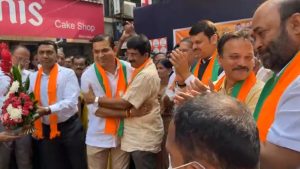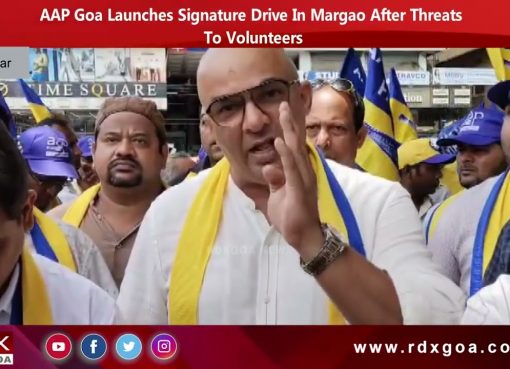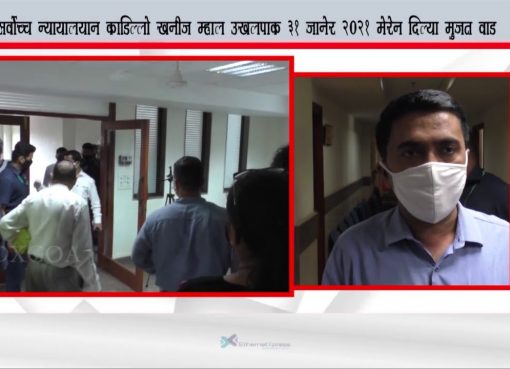

PANAJI: After much dilly dallying the very vocal MLA of Porvorim decided to bite the bullet and join the BJP — the party he was a fierce critic of until a few days ago.
For a long time it seemed that things were going in a different direction. Khaunte it seemed was well on his way towards the Congress. His close circle of workers formally joined the party and it appeared it was only a matter of time that Khaunte himself would make the move.
For a while it all seemed well — but then things took a rapid turn after his workers ‘en masse’ resigned claiming that they were humiliated by the Congress leadership. That of course was not the real reason. Within a day, Khaunte changed his stance cand claimed that for ‘development’ one needed to be on the ruling side and that he would take a decision in a few days.
Soon the cat was out of the bag and it didn’t take a genius to guess what was the real reason why Khaunte decided to ‘withdraw’ his supporters from Congress and within a few days join the BJP.
It has little to do with principles and everything to do with power. Where does that leave the things that Khaunte while in opposition has said against the present government and how is the voter supposed to judge him before deciding whether to vote for him for a third time or not. Is the voter to believe that Khaunte didn’t really mean the things he said over the last few years against the government?
Or do these issues not matter anymore to the electorate?
A two time MLA Khaunte first benefitted from the BJP fielding a weak candidate against him in the Porvorim constituency back in 2012 possibly on the understanding that he would support the party should they need the numbers. It turned out that the party didn’t need the numbers and Rohan was forced to take up a position on the opposition side of the fence. Over the five years between 2012-2017 the BJP built its own block and units of the party and came narrowly close to defeating Khaunte in the 2017 elections. However, a combination of factors including an anti-incumbency ensured that Khaunte won the election.
Now began a jolly ride in which Khaunte first offered a letter of support to the Congress, then made an about turn and supported the BJP to make Parrikar the Chief Minister, was dropped from the cabinet, began taking on the government and now all of a sudden is back with the BJP.
There are two aspects to the winning candidate in the elections — the votes he can pull based on his personal support base and the votes he pulls because of the party ticket he stands on. Every candidate needs a bit of both to get across the line — unless of course you are one of those candidates who can win from their constituency no matter which side they stand on.
For the political parties they want with the largest personal base on their side promising to give them the party’s vote share in the bargain. It’s a win-win situation in most cases — except when the party overestimates the personal pull the candidate has and its own strength in the constituency.
The candidate too can goof up when he fails to sense the people’s sentiment against the party in power and overestimates his own supporters sentiments.
In the bargain, the BJP’s Porvorim block which had taken up positions firmly against Rohan Khaunte and even personally faced his heavy handedness at much personal cost have been left out in the cold and feeling used by the party that they helped build only to see their effort ignored by the party leadership.
But where does this leave the voter? And can political workers — karyakartas ever rely on any mainstream political party again?
To answer the question we will have to ask ourselves another. Do voters vote for the individual or the party and is one exclusive of another?
There are several voting patterns that are not new but are easy to identify. These patterns explain why the people who win elections often tend to be crorepatis with criminal records rather than people who have a lifestyle and ethical mindset that is similar to the average voter. It also explains why candidates manage to win elections even when they defect from one party to another.
Given that the systems of governance in India are heavily bureaucratized and even getting a small permission or licence requires you to pay a bribe or wield some influence, people have turned to ‘agents’ to help sort out their issues. Politicians have learnt this very well and have decided that they will be the agents and help people get their work done. This gives the individual an overbearing influence on his voters and in a place like Goa holds much more value than some abstract principle the political party pledges to stand by.
The voter gets his work done and the politician gets his votes — lost in the bargain is the karyakarta who is left to lament his fate in front of the TV cameras in the hope that his lament will move at least a few to now vote for him with the sole aim of defeating the politician. And every once in a while the karyakarta defeats the master and the cycle begins once again.
Lost in the bargain is the idea that the common good should always trump individual interest — but in reality when the voter votes it is almost always for individual interest rather than common good. And therein lies the contradiction that is now inherent to democracy.
By – Andrea Fernandes





